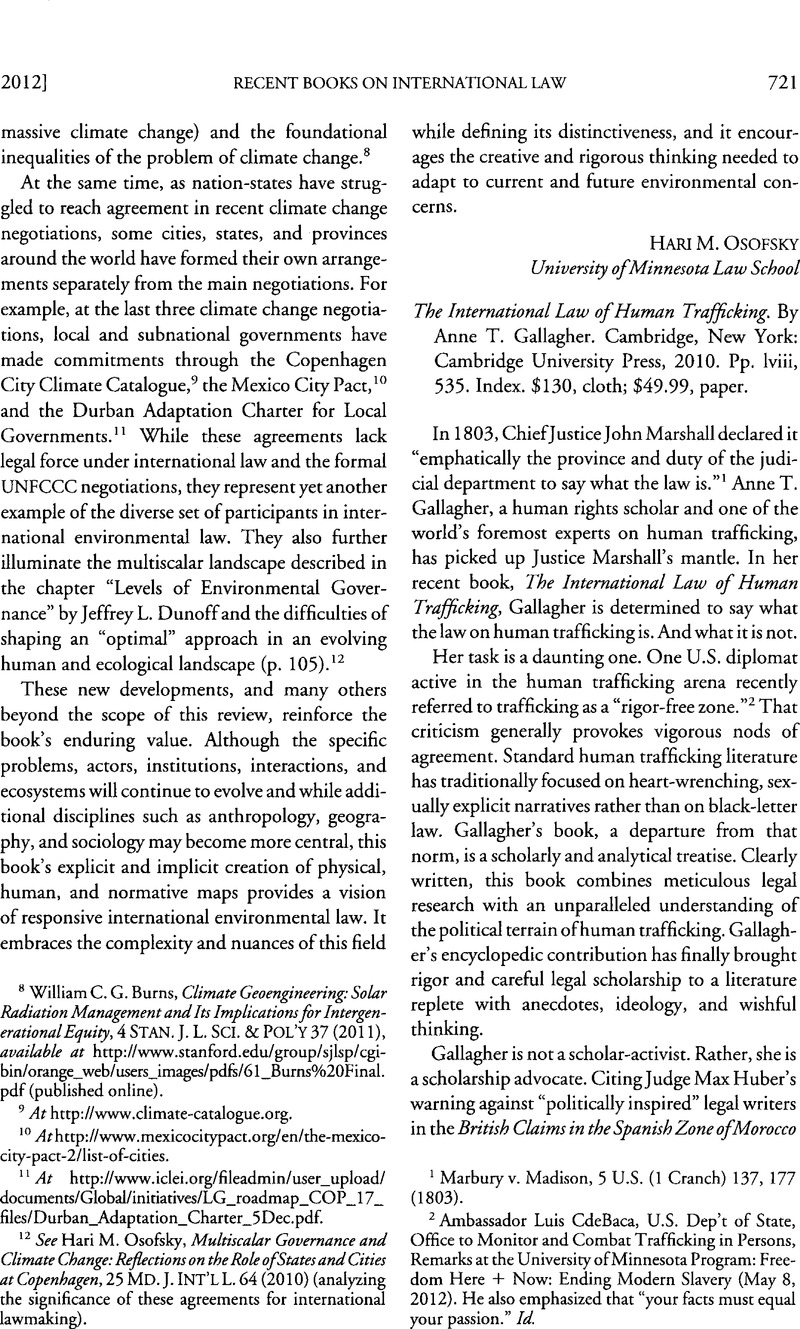Published online by Cambridge University Press: 20 January 2017

1 Marbury v. Madison, 5 U.S. (1 Cranch) 137, 177 (1803).
2 Ambassador Luis CdeBaca, U.S. Dep’t of State, Office to Monitor and Combat Trafficking in Persons, Remarks at the University of Minnesota Program: Freedom Here + Now: Ending Modern Slavery (May 8, 2012). He also emphasized that “your facts must equal your passion.” Id.
3 British Claims in the Spanish Zone of Morocco (Spain v. UK), 2 R.I.A.A. 615 (Perm. Ct. Arb. 1925) (Huber, sole arb.).
4 Protocol to Prevent, Suppress and Punish Trafficking in Persons, Especially Women and Children, Nov. 2, 2000, UN Doc. A/55/383, at 53, 40 ILM 377 (2001) [hereinafter Trafficking Protocol].
5 United Nations Convention Against Transnational Organized Crime, Nov. 15, 2000, TIAS No. 13, 127, 2225 UNTS 209.
6 Office of the High Commissioner for Human Rights, UN Recommended Principles and Guidelines on Human Rights and Human Trafficking, May 20, 2002, UN Doc. E/2002/68/Add. 1 [hereinafter Recommended Principles and Guidelines], available at http://www.unhcr.org/refworld/docid/3flfc60f4.html.
7 Richard Nixon, in the Arena: A Memoir of the Victory, Defeat, and Renewal (1990).
8 Article 5(1) of the Trafficking Protocol, supra note 4, requires that each state party “adopt such legislative and other measures as may be necessary to establish as criminal offences the conduct set forth in article 3 of this Protocol, when committed intentionally.”
9 Id., Art. 3(a). Article 3(c) clarifies that the means described in the definition are not required when the victim is a child under eighteen years of age. Even with out these elements, the act qualifies as trafficking under the Trafficking Protocol in the case of a minor.
10 The Trafficking Protocol’s articles dealing with protection and support do not mandate action. For example, Article 6, concerning “Assistance to and protection of victims of trafficking in persons,” requires only that states consider implementing measures to provide for the “physical, psychological and social recovery of victims of trafficking . . . .” The provision of housing, medical care, legal assistance, and counseling is entirely discretionary. Id.
11 The U.S. State Department statistics do not include organ trafficking. U.S. Dep’t of State Trafficking in Persons Report 44 ( June 2012) [hereinafter 2012 Trafficking Report], available at http://www.state.gov/j/tip/rls/tiprpt/2012/index.htm.
12 Id. Gallagher studiously avoids statistics on trafficking in her book, a reflection of the unreliability of those numbers. But, by way of comparison, the International Labour Organization (ILO) released updated estimates for human trafficking and forced labor in June 2012. The ILO reported that approximately 14.2 million individuals around the world are held in forced labor. The ILO estimated another 4.5 million are held in servitude in the sex industry. International Labour Organization, New ILO Global Estimate of Forced Labour: 20.9 million (June 1, 2012), available at http://www.ilo.org/sapfl/News/WCMS_182109/lang-en/index.htm.
13 See infra note 21 and accompanying text.
14 Convention for the Suppression of the Traffic in Persons and of the Exploitation of the Prostitution of Others, GA Res. 317 (IV) (Dec. 2, 1949).
15 Convention on the Elimination of All Forms of Discrimination Against Women, Dec. 18, 1979, 1249 UNTS 13.
16 Recommended Principles and Guidelines, supra note 6.
17 Convention to Suppress the Slave Trade and Slavery.Art. l, Sept. 25, 1926, 46 Stat. 2183, 60 LNTS 253.
18 E.g., Jean Allain, The Slavery Conventions, The Travaux Preparatoires of the 1926 League of Nations Convention and the 1956 United Nations Convention (2008).
19 One of the leading proponents of this international law theory is Catharine MacKinnon. MacKinnon, Catherine A., Pornography as Trafficking, 26 Mich. J. Int’l L. 993, 1004 (2004)Google Scholar.
20 Gallagher discusses the legal underpinnings of the “trafficking as slavery” debate in section 3.3.2 of the book.
21 Annual TIP Reports are available at the U.S. Department of State’s website, http://www.state.gOv/j/tip/rls/tiprpt/.
22 U.S. Dep’t of State, Trafficking in Persons Report 17 (June 2011), available at http://www.state.gov/documents/organization/164452.pdf. Interestingly, Gallagher is named a “TIP Hero” in the 2012 Trafficking Report, supra note 11, at 47.
23 22 U.S.C. §§7102-7112.